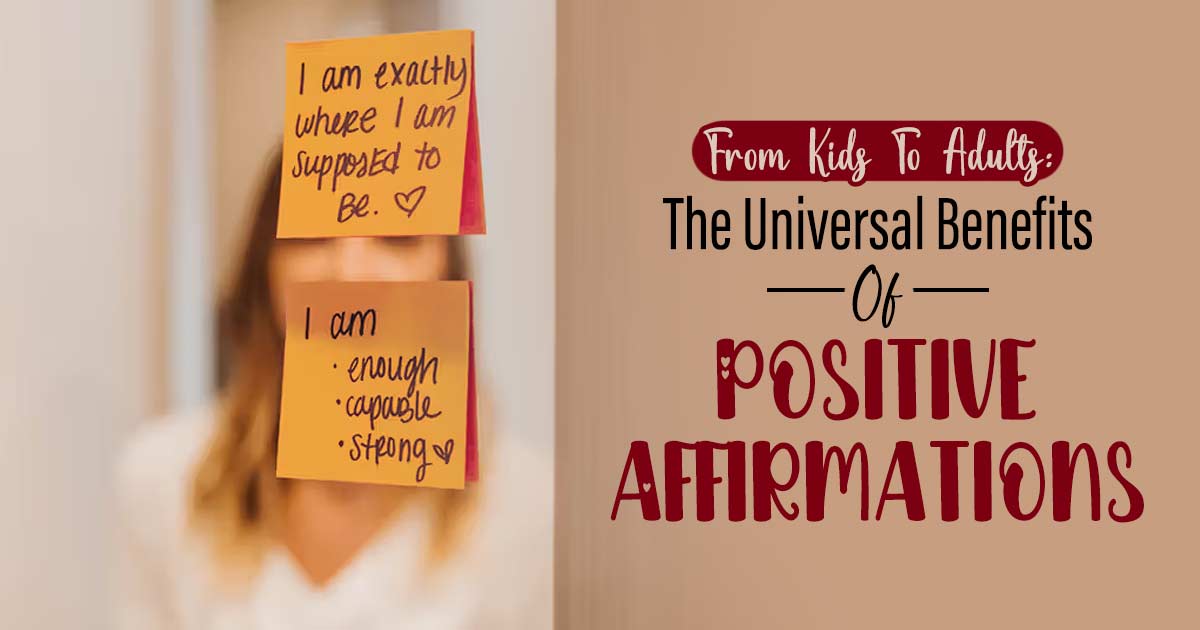In an increasingly fast-paced and demanding world, the importance of mental health self-care cannot be overstated. From adults managing work-related stress to children navigating the challenges of growing up, maintaining emotional well-being is essential for everyone.
Positive affirmations, simple yet profound statements that promote self-love and optimism, have emerged as a potent tool for enhancing mental health. This essay explores why positive affirmations for mental health serve as the ultimate self-care practice for both adults and children alike.
The Mental Health Crisis
Before delving into the benefits of positive affirmations for mental health, it is essential to acknowledge the mental health crisis that plagues society today. The stressors of modern life, from the constant bombardment of information to the pressures of career and personal responsibilities, have taken a toll on the mental well-being of adults and children alike. According to the World Health Organization, depression is now the leading cause of disability worldwide, highlighting the urgent need for effective mental health self-care strategies.
What Are Positive Affirmations?
Positive affirmations are simple, positive statements that individuals can repeat to themselves regularly. These statements are designed to challenge and replace negative self-talk and beliefs with more positive and empowering ones. Positive affirmations for mental health can be tailored to address specific concerns or used to promote general well-being. They are typically short, concise, and phrased in the present tense to maximize their impact.
The Science Behind Positive Affirmations For Mental Health
Positive affirmations are not merely a feel-good exercise; there is substantial scientific evidence supporting their effectiveness. One of the key mechanisms through which daily positive affirmations work is by reshaping neural pathways in the brain. Repeatedly thinking and saying positive statements can create new, more constructive thought patterns, ultimately leading to improved mental well-being.
Research has also shown that positive affirmations for mental health can reduce stress and anxiety. When individuals engage in positive self-talk, the brain’s stress response is mitigated, leading to a greater sense of calm and relaxation. This, in turn, supports overall mental health.
The Benefits Of Positive Affirmations For Mental Health In Adults

Positive affirmations for mental health offer a multitude of benefits for adults seeking to cope with emotional difficulties:
1. Stress Reduction:
Affirmations help adults manage stress by promoting a positive mindset and reducing the physiological responses associated with stress, such as elevated cortisol levels.
2. Boosted Self-Esteem:
Regular use of affirmations can improve self-esteem and self-worth, helping adults feel more confident in themselves and their abilities.
3. Improved Resilience:
Affirmations foster resilience by encouraging a growth mindset and the belief that setbacks are opportunities for growth rather than failures.
4. Enhanced Self-Compassion:
Positive self-talk through affirmations promotes self-compassion, which is crucial for maintaining mental health and well-being.
5. Increased Optimism:
By focusing on positive aspects of life, affirmations help adults cultivate optimism, which can counteract negative thinking and improve mood.
The Benefits Of Positive Affirmations For Mental Health In Children

Children, too, can reap the rewards of positive affirmations:
1. Self-Confidence:
Affirmations boost children’s self-confidence and self-belief, which is especially valuable during the formative years of their development.
2. Emotional Regulation:
Encouraging children to use affirmations helps them manage their emotions more effectively, reducing outbursts and improving emotional well-being.
3. Resilience:
Teaching children to view challenges as opportunities for growth through affirmations builds resilience and a positive attitude towards setbacks.
4. Positive Self-Image:
Affirmations contribute to a positive self-image, which is vital for developing healthy relationships and a strong sense of self.
5. Optimism:
Focusing on the positive aspects of life through affirmations helps children develop an optimistic outlook, fostering a greater sense of happiness and well-being.
How To Implement Positive Affirmations For Mental Health
Implementing daily positive affirmations into one’s everyday routine is relatively simple and can be adapted by both adults and children:
1. Choose Affirmations:
Select affirmations that resonate with you or your child’s specific needs or goals. For adults, these could include statements like, “I am capable of handling challenges,” while children might benefit from affirmations like, “I am brave and kind.”
2. Repetition:
Repeat chosen affirmations regularly, ideally everyday. Consistency is key to reshaping thought patterns.
3. Visualization:
Encourage the use of mental imagery to reinforce affirmations. Ask your child to visualize themselves being brave or confident, for example.
4. Affirmation Cards:
Create or purchase affirmation cards that can be displayed in visible places as reminders. For children, colorful and engaging cards with images can be particularly effective.
5. Affirmation Journals:
Adults can keep journals where they write down daily positive affirmations, while children can draw or write their affirmations in a dedicated notebook.
In a world where mental health challenges are increasingly prevalent, positive affirmations offer a simple yet effective means of self-care for both adults and children. By reshaping thought patterns, promoting self-compassion, and fostering a positive outlook, affirmations can empower individuals to take control of their mental well-being.
When incorporated into daily routines, they become a valuable tool in the journey towards better mental health, ultimately contributing to happier, more resilient, and emotionally well-balanced individuals of all ages.


